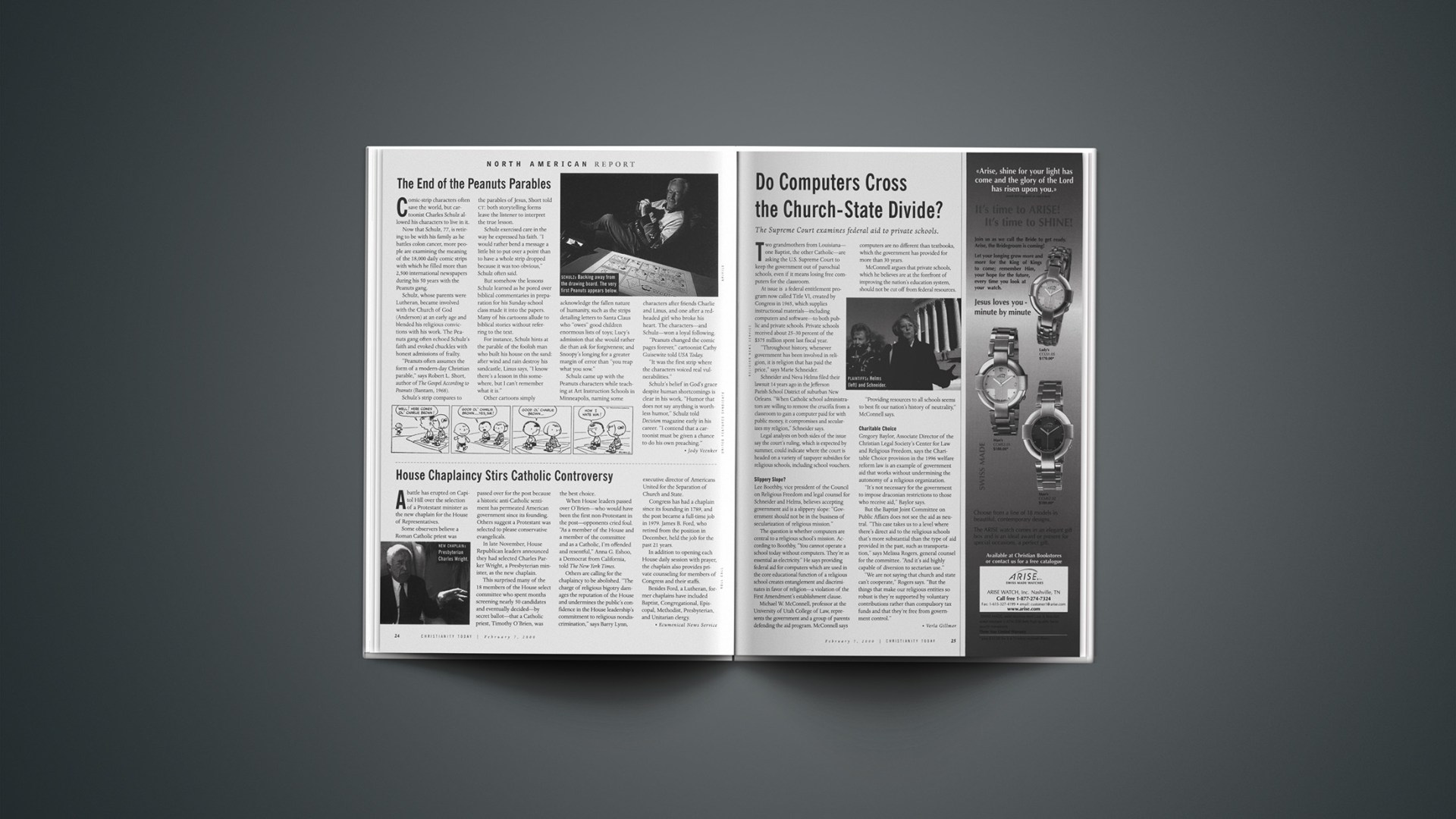Comic-strip characters often save the world, but cartoonist Charles Schulz allowed his characters to live in it.In the wake of Schulz’s death Saturday night, more people are examining the meaning of the 18,000 daily comic strips with which he filled more than 2,500 international newspapers during his 50 years with the Peanuts gang. The enduring popularity of Charlie Brown, Snoopy, Linus, and Lucy can be traced beyond the cartoon’s gentle reflections to the frustrations Schulz allowed his characters to face.
Schulz, whose parents were Lutheran, became involved with the Church of God (Anderson) at an early age and blended his religious convictions with his work. The Peanuts gang often echoed Schulz’s faith and evoked chuckles with honest admissions of frailty.
“Peanuts often assumes the form of a modern-day Christian parable,” says Robert L. Short, author of The Gospel According to Peanuts (Bantam, 1968).
Schulz’s strip compares to the parables of Jesus, Short told Christianity Today: both storytelling forms leave the listener to interpret the true lesson.
Schulz, who died at age 77, exercised care in the way he expressed his faith. “I would rather bend a message a little bit to put over a point than to have a whole strip dropped because it was too obvious,” Schulz often said.
But somehow the lessons Schulz learned as he pored over biblical commentaries in preparation for his Sunday-school class made it into the papers. Many of his cartoons alluded to biblical stories without referring to the text.
For instance, Schulz hinted at the parable of the foolish man who built his house on the sand: after wind and rain destroy his sandcastle, Linus says, “I know there’s a lesson in this somewhere, but I can’t remember what it is.”
Other cartoons simply acknowledged the fallen nature of humanity, such as the strips detailing letters to Santa Claus who “owes” good children enormous lists of toys; Lucy’s admission that she would rather die than ask for forgiveness; and Snoopy’s longing for a greater margin of error than “you reap what you sow.”
Schulz came up with the Peanuts characters while teaching at Art Instruction Schools in Minneapolis, naming some characters after friends Charlie and Linus, and one after a redheaded girl who broke his heart.
Schulz originally called his work “L’il Folks,” but newspapers said the title was too similar to another popular comic strip.
For 50 years, Schulz chafed under a popular title that he felt belittled his characters. Even with 1,400 books, four animated television specials, an award-winning Broadway show, and a star on the Hollywood Walk of Fame, you can’t win them all, Charlie Brown.
But Schulz did win a loyal following.
“Peanuts changed the comic pages forever,” cartoonist Cathy Guisewite told USA Today. “It was the first strip where the characters voiced real vulnerabilities.”
Schulz’s belief in God’s grace despite human shortcomings was clear in his work. “Humor that does not say anything is worthless humor,” Schulz told Decision magazine early in his career. “I contend that a cartoonist must be given a chance to do his own preaching.”Jody Veenker is Editorial Resident for Christianity Today.
Related Elsewhere
See coverage of the last Peanuts strip and Schulz’s death in The Washington Post (which ran multiple tributes), The New York Times, and elsewhere.Michael Maudlin, Online Executive Editor for Christianity Today, has a discussion of Schulz’s faith and a review of Robert Short’s The Gospel According to Peanuts on Beliefnet.
Copyright © 2000 Christianity Today. Click for reprint information.










